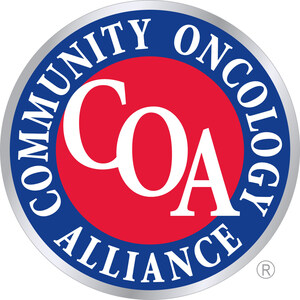President's Budget Grounds Cancer Moonshot; Fails Patients and Taxpayers
Will Drive Up Costs for Seniors with Cancer and Taxpayers, says COA
Leaked Mandatory CMS Payment 'Experiment' Misguided
WASHINGTON, Feb. 11, 2016 /PRNewswire-USNewswire/ -- The federal budget just released by President Obama contains another harmful cut to Medicare payments for cancer drugs. If implemented, the cut would further consolidate cancer care into the more expensive hospital setting and in the process cause access problems for seniors and disabled individuals with cancer who are covered by Medicare.
Specifically, the President's budget proposes cuts to the way Medicare pays for cancer drugs. Medicare currently pays what is known as "Average Sales Price" (ASP) plus 6 percent to cover the costs of storage, inventory, and preparation required to deliver these complex and sometimes toxic drugs. The budget would slash payment by half, to ASP plus 3 percent, as a cost savings measure. This cut ignores the fact that the Centers for Medicare & Medicaid Services (CMS) has already reduced payments to close to ASP + 4 percent by inappropriately applying the Medicare sequester cut to the cost of cancer drugs. The result is that the President is really calling for a cut to a little above ASP.
"These cuts to cancer care increase costs to patients and handicap community cancer practices that are the primary participants in vital clinical trials," said Bruce Gould, MD, president of Community Oncology Alliance (COA) and a practicing community oncologist with Northwest Georgia Oncology Centers in Marietta, Ga. "The President calls for a moonshot on cancer but his budget, with misguided cuts and insufficient research funding, scuttles the rocket before it even gets to the launch pad."
Cuts to cancer care payments as a result of imprudent public policy have resulted in a dramatic weakening of the cancer care delivery system across America. In just the last nine years over 300 community cancer clinics have closed and close to 550 have been incorporated into much more expensive hospital systems. This has reduced patient choice and access, while increasing costs for cancer care.
In addition to the budget, a recently leaked document from CMS outlined a mandatory payment "experiment" by Medicare on how community oncologists treat their patients. This "experiment" further compounds the mistaken approach the budget and CMS are taking in dealing with cancer care in this country. Although posting notification of the payment "experiment" was categorized as a mistake and "premature" by CMS, it illustrates how out of touch the agency is with the changing landscape of cancer care and what is really increasing costs.
If the Administration is truly interested in addressing the increasing costs of cancer care, it must start with the ballooning 340B drug discount program in hospitals. Just released studies document that over 30 percent of all cancer drugs reimbursed under Medicare Part B are discounted by 340B. In hospital outpatient facilities, over 60 percent of the cancer drugs are discounted by 340B. The President and his Medicare agency, CMS, are concerned about "excessive payment" to community cancer clinics but completely ignore 340B hospitals that are reimbursed at upwards of effectively ASP plus 100 percent, considering 340B discounts as high as 50% on cancer drugs.
"Frankly, the President's budget and the leaked CMS 'experiment' totally miss the mark are on what is truly driving increased costs and consolidation of cancer care in this country," said Ted Okon, executive director of COA. "The Government Accountability Office – the government's own independent watchdog – concluded that 340B hospitals have a huge financial incentive that is having a direct adverse impact on seniors with cancer, Medicare, and taxpayers."
The 340B program has seen incredible growth with no signs of slowing down, despite a dramatic reduction in the number of uninsured and underinsured Americans in the country that originally sparked its need. A big reason for this growth was clearly captured in a study by the independent Government Accountability Office (GAO) on the 340B program which concluded that:
"The financial incentive to maximize Medicare revenues through the prescribing of more or more expensive drugs at 340B hospitals also raises concerns… Not only does excess spending on Part B drugs increase the burden on both taxpayers and beneficiaries who finance the program through their premiums, it also has direct financial effects on beneficiaries who are responsible for 20 percent of the Medicare payment for their Part B drugs. Furthermore, this incentive to prescribe these drugs raises potential concerns about the appropriateness of the health care provided to Medicare Part B beneficiaries."
Community oncology providers stand ready to work with the President and CMS to maintain and improve a strong and accessible cancer care delivery system in America that will help make the cancer moonshot a success. However, in order to do that, we must end the misguided cuts and policies that are increasing the costs of treating cancer care.
About Community Oncology Alliance
The Community Oncology Alliance (COA) is a non-profit organization dedicated to advocating for community oncology practices and, most importantly, the patients they serve. COA is the only organization dedicated solely to community oncology where close to 70% of Americans with cancer are treated. The mission of COA is to ensure that cancer patients receive quality, affordable, and accessible cancer care in their own communities. COA has pioneered policy on the Oncology Medical Home (OMH) and payment reform for cancer care, and maintains active networks of patient advocates (CPAN), practice administrators (CAN), and pharmacy personnel (COPA) dedicated to enhancing community cancer care. To learn more visit www.CommunityOncology.org.
SOURCE Community Oncology Alliance
Related Links
WANT YOUR COMPANY'S NEWS FEATURED ON PRNEWSWIRE.COM?
Newsrooms &
Influencers
Digital Media
Outlets
Journalists
Opted In





Share this article